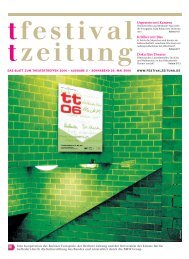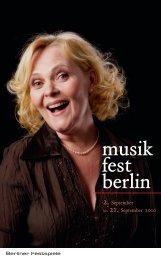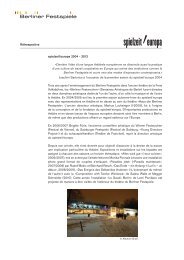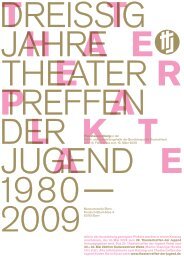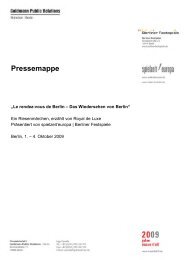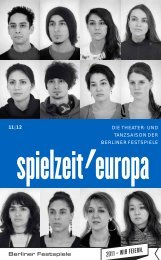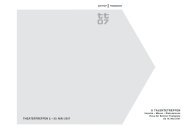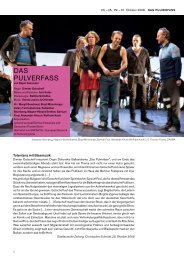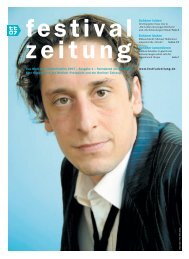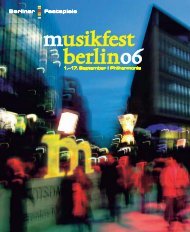Programme of the 9th international literature festival berlin 2009
Programme of the 9th international literature festival berlin 2009
Programme of the 9th international literature festival berlin 2009
You also want an ePaper? Increase the reach of your titles
YUMPU automatically turns print PDFs into web optimized ePapers that Google loves.
Sun, 13.09. at 11 am, Haus der Berliner Festspiele / Upper Foyer<br />
Focus Arabic World<br />
Prose <strong>of</strong> <strong>the</strong> Arabic Peninsula I<br />
PRESENTER: Gün<strong>the</strong>r Orth, SPEAKER: Frank Arnold<br />
Youssef Al-Mohaimeed (Saudi Arabia). Al-Mohaimeed became famous in Europe with his début<br />
novel, Fikhakh al-ra’iha (t: Wolves <strong>of</strong> <strong>the</strong> crescent moon), which was banned in Saudi Arabia. It is<br />
an enthralling, poetic, and surreal story <strong>of</strong> three outsiders. His new novel Al-Hamam la yatir fi<br />
Buraida (t: No pigeons fly in Buraydah) is about <strong>the</strong> subtle public tyranny <strong>of</strong> <strong>the</strong> so-called<br />
“Committee For Virtue,” which stalks young unmarried couples in Riyadh.<br />
Abduh Khal (Saudi Arabia). Khal is a master <strong>of</strong> detailed and complexly arranged observations<br />
about his country. The novelist and essayist concentrates in his works on <strong>the</strong> overlooked and<br />
neglected. The village is <strong>of</strong>ten at <strong>the</strong> centre <strong>of</strong> his literary work, a universal symbol <strong>of</strong> <strong>the</strong> traditional<br />
Arab world.<br />
Arwa Abduh Othman (Yemen). Arwa Abduh Othman weaves stories from <strong>the</strong> silken threads <strong>of</strong><br />
her childhood memories, inspired by stories her grandmo<strong>the</strong>r told her and <strong>the</strong> richness <strong>of</strong> <strong>the</strong><br />
Yemenite fairy tale tradition. In Shabbaik Labbaik a man marries a tyrannical dog who, it transpires,<br />
is a bewitched young beauty – which does not necessarily mean that <strong>the</strong>re will be a happy end.<br />
Sun, 13.09. at 11 am, Maison Victor<br />
Specials<br />
The next Joyce will come from <strong>the</strong> Orient<br />
Samuel Shimon (Iraq/Britain) and Stefan Weidner (Germany)<br />
PRESENTER: Jan Valk SPEAKER: Oliver Führmann<br />
Samuel Shimon was born in Iraq in 1956 and has lived in Syria, Jordan, Lebanon, Egypt, Tunisia,<br />
France, and today lives in London. The journalist is among <strong>the</strong> most important agents <strong>of</strong> Arab<br />
<strong>literature</strong> in <strong>the</strong> world (including being on <strong>the</strong> jury for <strong>the</strong> Arabic Booker Prize). He will read form his<br />
novel An Iraqi in Paris and talk with <strong>the</strong> translator Stefan Weidner about Arab exile <strong>literature</strong>.<br />
Admission is free.<br />
Sun, 13.09. at 1:30 pm, Haus der Berliner Festspiele / Upper Foyer<br />
Focus Arab World_Reflections<br />
What languages does Arab <strong>literature</strong> speak?<br />
with Abbas Khider (Iraq/Germany), Leila Sebbar (France/Algeria) and Suleman Taufiq<br />
(Syria/Germany)<br />
PRESENTER: Stefan Weidner<br />
What literary languages are <strong>the</strong>re in Arab <strong>literature</strong>? Where does <strong>literature</strong> cross regional and<br />
national boundaries? The Arab world in particular is characterised by migration and inter-cultural<br />
influences. Immigrants, exile writers, Palestinians, <strong>the</strong> people <strong>of</strong> <strong>the</strong> Maghreb – <strong>the</strong> cultural<br />
diversity within <strong>the</strong> Arab world is enormous. This is also reflected in <strong>the</strong>ir <strong>literature</strong>. This event<br />
features simultaneous translation. Headsets are available in <strong>the</strong> downstairs foyer.<br />
Sun, 13.09. at 1:30 pm, Haus der Berliner Festspiele<br />
Focus Arab World_Reflections<br />
UNESCO WORKSHOP: The Magna Carta <strong>of</strong> <strong>international</strong> culture politics<br />
The forms <strong>of</strong> expression in <strong>the</strong> UNESCO agreement for <strong>the</strong> protection and support <strong>of</strong> cultural<br />
diversity (2005) bring human rights into culture-politics. The goal is to set standards for <strong>the</strong><br />
development <strong>of</strong> culture and <strong>the</strong> interaction between cultures. Member states are required to put<br />
political institutions in place which respect, protect and support cultural diversity. Authors from<br />
various countries speak about <strong>the</strong> opportunities <strong>the</strong> convention has made possible in <strong>the</strong>ir regions.<br />
Internal Author workshop in cooperation with <strong>the</strong> German UNESCO-Commission e. V. Closed<br />
Event.<br />
2



